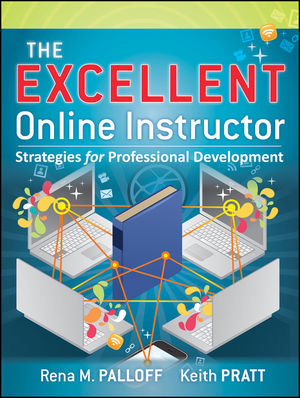The Excellent Online Instructor: Strategies for Professional DevelopmentISBN: 978-0-470-63523-0
Paperback
200 pages
February 2011, Jossey-Bass
 This is a Print-on-Demand title. It will be printed specifically to fill your order. Please allow an additional 10-15 days delivery time. The book is not returnable.
|
||||||
List of Figures and Tables ix
Preface xi
Acknowledgments xix
The Authors xxi
PART ONE The Excellent Online Instructor
ONE What Are the Characteristics of Excellent Online Teaching? 3
What Does the Excellent Online Instructor Look Like? 5
The Importance of Establishing Presence 7
Engaging Learners and Creating Community 9
Excellence in Course Development 10
Providing Effective Facilitation When Teaching Courses Developed by Others 11
Good Facilitation Online:What Is Involved? 12
Key Points That Define the Excellent Online Instructor 13
Becoming Your Own Faculty Developer 14
TWO Phases of Development 16
Faculty Readiness to Teach Online 17
The Phases of Online Faculty Development 20
The Key to Understanding the Phases 28
Faculty Mentoring for Online Teaching 29
Dealing with Faculty Resistance 30
Key Points Regarding Training Needs and Phases of Development for the Excellent Online Instructor 33
Becoming Your Own Faculty Developer 34
THREE Elements of Training for Excellence 35
What Does Good Faculty Training Look Like? 36
Online, Face-to-Face, or Hybrid:Which Works Best? 41
Who Should Conduct Training for Online Teaching? 42
Key Points in Training for Excellence 43
Becoming Your Own Faculty Developer 44
PART TWO Supporting the Movement from New to Great
FOUR Models of Faculty Development 47
A Phased Approach to Online Faculty Development 48
Establishing a Long-Term Faculty Development Effort 53
The Learning Community Approach to Online Faculty Development 54
Working with Adjuncts at a Distance 57
Training Efficiently 59
Certificate Programs in Online Teaching 60
Key Points Regarding Models of Online Faculty Development 62
Becoming Your Own Faculty Developer 63
F I VE Mentoring Online Faculty 64
Common Elements of Mentoring Approaches 65
Approaches to Mentoring for Online Teaching 68
Developing an Effective Mentoring Program 70
What Organizations Can Do to Promote Mentoring 74
Key Points About Mentoring Online Faculty 75
Becoming Your Own Faculty Developer 75
S I X The Widening Gap: Professional Development for K–12 Teachers 77
Online Teaching Methods in the K–12 Environment 79
Characteristics of Excellent Online Teachers 81
Preservice Teacher Preparation and Professional Development 82
Coping Effectively with the Issues and Challenges of K–12 Online Teaching 85
Key Points in K–12 Online Teaching 86
Becoming Your Own Faculty Developer 86
PART THREE Connecting the Dots: Faculty Development and Evaluation
SEVEN Linking Training to Faculty Evaluation 91
Online Course Evaluation and Faculty Evaluation 92
Managing and Evaluating Faculty at a Distance 99
Key Points on Linking Faculty Development to Evaluation 102
Becoming Your Own Faculty Developer 102
E I G H T Best Practices in the Development of Excellent Online Faculty 104
Best Practices for Faculty Developers and Faculty Tasked with Faculty Development 105
Best Practices for Faculty Engaged in Their Own Development 110
Best Practices for Institutions 112
A ‘‘Best System’’ for Developing Excellent Online Instructors 113
Resources for Faculty Developers, Faculty, and Administrators
Appendix A: Resources for Faculty Developers and Those Tasked with Faculty Development 119
Appendix B: Resources for Faculty 139
Appendix C: Resources for Administrators of Online Programs 149
References 159
Index 167



